SUMMARY
This is AI generated summarization, which may have errors. For context, always refer to the full article.
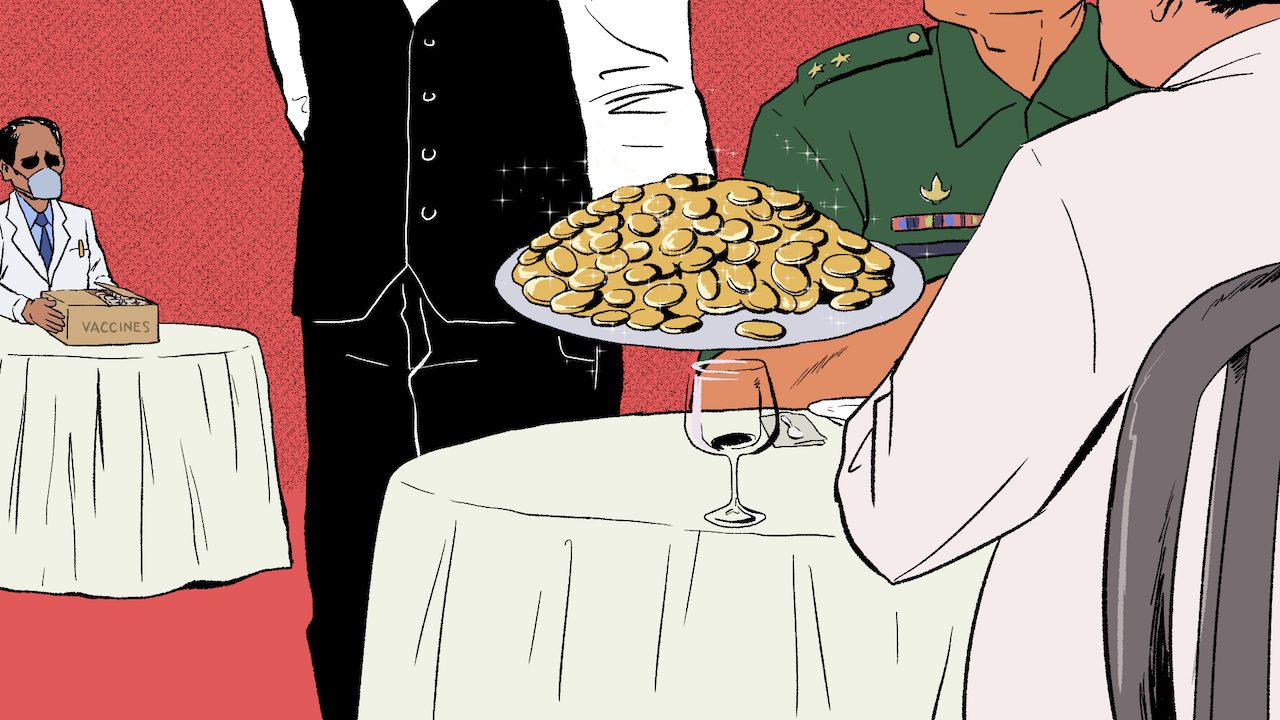
The Duterte administration’s strategy in quelling the public health and socioeconomic crises caused by the COVID-19 pandemic in the Philippines is largely hinged on one thing: vaccines.
And yet the proposed P4.5-trillion national budget for 2021 relegates a vast majority of funds for COVID-19 vaccines – P70 billion – to the “unprogrammed” category, or those dependent on the availability of revenues.
Unprogrammed funds are, in the strictest sense, not guaranteed. Senator Franklin Drilon likened it to an “unfunded check.”
“I hope it doesn’t bounce,” Drilon said on Friday, December 11.
As lawmakers scoured the 2021 General Appropriations Bill (GAB) for items they could trim and reallocate for vaccines, certain items were deemed untouchable even if their necessity was debatable. Among them? The P19.1-billion anti-insurgency fund of the National Task Force to End Local Communist Armed Conflict (NTF-ELCAC).
Meanwhile, a nearly P70-billion chunk of questionable local infrastructure projects marked by Senator Panfilo “Ping” Lacson Jr for realignment found its way into the final version of the budget bill. It could have easily been used as sure funding for COVID-19 vaccines.
Moments before ratifying the budget bill, senators asked why the bicameral conference committee that finalized the measure left funds and plans for vaccinating Filipinos against COVID-19 so uncertain.
“I was hoping that during the bicam, the Executive would talk to both chairpersons, and I was thinking that they would be making a request, more so today that we see that rollout has begun and you need to make advance payments for these vaccines,” said Senate President Pro Tempore Ralph Recto.
Don’t say ‘there’s no money’
On Wednesday, December 9, the two chambers of Congress ratified the P4.5-trillion 2021 General Appropriations Act (GAA), now just the President’s signature away from enactment. The budget bill allotted P72.5 billion for COVID-19 vaccines in 2021.
Adding the P10 billion provided for by the Bayanihan to Recover as One Act (Bayanihan 2), the government has a total budget of P82.5 billion for COVID-19 vaccines in 2021.
It’s not the P100 billion to P150 billion Recto estimated the country would need to procure vaccines and cover the logistics of immunizing some 70 million Filipinos – the number needed to attain herd immunity.
Moreover, only P2.5 billion of that P82.5 billion is programmed under the 2021 budget, i.e., with assured funding from government revenues.
The other P80 billion, both in the GAA and in Bayanihan 2, is unprogrammed, dependent upon the availability of government revenues.
If COVID-19 vaccines are central to the government’s tack in addressing the pandemic, why are the funds for them tied to contingent monies? Is there no room in the P4.5-trillion budget for what could be the antidote to all the crises caused by the coronavirus?
Senator Sonny Angara, head of the Senate finance committee and sponsor of the budget bill, said Finance Secretary Sonny Dominguez assured him of a “high probability” that there will be enough non-tax revenues and excess collections to fund unprogrammed appropriations, including the vaccines.
“All of us are unclear how we will fund the P70 billion unprogrammed funds because, I’m sorry to say, what you enumerated as excess collection, given the pandemic – there is no excess in collection,” Drilon, the Senate minority leader, told Angara moments before they ratified the spending measure.
“We will be having deficits. New revenue collection? Let us be candid with each other. This is not forthcoming. Where will this be coming from?” Drilon said.
Luis Abad, chairperson of the Institute of Leadership, Empowerment and Democracy (iLEAD), told Rappler he does not believe that all the programmed appropriations in the proposed 2021 budget were so important that they couldn’t scoot over for COVID-19 vaccines.
“There’s a P4.5-trillion budget for next year. The question is, where do we prioritize that P4.5 trillion?” said Abad, who used to work as chief of staff at the Department of Finance during the Aquino administration.
“Obviously, the trade-offs being made by the Executive and supported by the majority of the Senate is in favor of the need for buildings, more money for our security forces, and the recently-passed tax cuts for big businesses,” he added.
“So let’s not fall into the trap of saying that there’s no money, or there’s limited funds,” Abad said.
Anti-insurgency funds: Can’t they wait a year?
The Duterte administration originally proposed only P2.5 billion as its budget for COVID-19 vaccines in its 2021 National Expenditure Program, submitted to Congress by the Department of Budget and Management in late August.
In the weeks that followed, candidate vaccines against COVID-19 began to show promise, moving into advanced trial phases. Somewhat like an afterthought, lawmakers began scouring the budget for items they could trim to shore up a more bankable allotment for vaccines.
The House of Representatives had already passed the budget bill on 3rd and final reading on October 16 when it decided it would increase the allocation for vaccines. The version of the budget bill the House transmitted to the Senate on October 27 raised the vaccine allotment from P2.5 billion to P8 billion.
It was then up to the Senate to further nip and tuck items in the proposed budget, because it was by then clear that P8 billion would not be nearly enough to immunize a significant portion of the population against the coronavirus.
When senators tackled the budget bill in November, some of them right away thought the P19.1-billion anti-insurgency fund could be realigned to the vaccine budget.
Senator Nancy Binay asked, isn’t the P16.4 billion barangay development fund within the anti-insurgency fund redundant? 822 barangays would receive infrastructure, education, and livelihood assistance for having been recently cleared of communist guerrillas.
Isn’t it the government’s job to supply all these to every barangay in the first place? Why a separate fund for a select handful barangays?
Senators with a background in the security forces readily defended the NTF-ELCAC budget.
Senator Ronald “Bato” dela Rosa, former national police chief, said it took the blood, sweat, and tears of the country’s soldiers and police to clear each of the 822 barangays of rebels. If the government does not deliver on its promise of a better life within the fold of the law, then these “cleared” barangays will all too easily slide back into insurgency, and earn the New People’s Army (NPA) more sympathizers, he said.
Lacson, also a former national police chief, said the communist insurgency has held the nation down too long, and 2021 is as good a year as any to be finally rid of it. He pointed out that the anti-insurgency fund would be administered by the Department of the Interior and Local Government, not by the military or the defense department. Hence, it wouldn’t be spent on guns and bullets but on rural development.
But Drilon said he still didn’t see how that trumped the urgency of obtaining an antidote to the pandemic. He called the administration’s priorities, as reflected in the proposed budget, “askew.”
“The insurgency problem has been with us [a long time]. I don’t think our programs will collapse if we postpone the P19-billion anti-insurgency funds to 2022,” said Drilon, who wanted the money spent on vaccines.
He and fellow opposition senators Risa Hontiveros and Francis Pangilinan proposed to reallocate all or part of the anti-insurgency fund for vaccines.
They were overruled by the majority.
It’s the President’s budget
Days before the Senate passed its version of the budget bill on November 26, Rappler asked Senate President Vicente Sotto III why he thought scrapping the NTF-ELCAC budget to make room for vaccines was out of the question.
First, if it’s a matter of P10 billion or P20 billion to add to the vaccine budget, Sotto said there were other items that can be sacrificed.
“Bakit mo pag-iinitan ‘yung anti-insurgency [fund]? That’s the question that we should pose. Bakit ‘yung anti-insurgency [fund] ang ta-target-in mo, eh kung may pagkukunan namang iba? Ngayon, kung walang pagkukunang iba at ito ang nakikita, then I will understand na i-suggest nila ‘yun. Pero at the start pa lang eh ang suggestion kaagad eh target-in ‘yung anti-insurgency [fund]. Hindi talaga kami makakapayag,” said Sotto, referring to the minority senators.
(Why would you hit on the anti-insurgency fund? That’s the question we should pose. Why would you target the anti-insurgency fund when there are other sources? Now, if there are no other sources besides this, then I will understand if they suggest that. But even at the start, their suggestion right away was to target the anti-insurgency fund. We really won’t agree to that.)
Sotto noted some P68 billion in funds for local infrastructure projects were flagged by Lacson as anomalous – why not use that for vaccines?
“And besides, really, it’s part of the main thrust of the administration,” Sotto said of the anti-insurgency campaign. Touching the budget for it would have been “a big no-no,” he added.
To once and for all clear barangays that used to be infested with rebels is the legacy the Duterte administration is going for, Sotto said.
Duterte being the chairperson of NTF-ELCAC, the P19.1-billion anti-insurgency fund is actually the President’s budget.
“So, I assure you, if we touch that, that will be vetoed,” Sotto added.
‘Sacred cows’ in the budget
“There should be no sacred cows in the proposed budget,” Hontiveros said, when Rappler asked her to comment on how the 2021 budget bill was shaping up.
The administration’s clear-hold-consolidate-develop strategy in addressing the communist insurgency is “so 1980s,” and history has proven it doesn’t work, she added.
“In fact, the proposal to take away [the anti-insurgency fund] for the sake of vaccines is also to ensure that people in those [822] barangays will be vaccinated. So just give the implementing agencies better handles at spending those funds…for priority needs right now – health, disaster response and preparedness, and stimulus to recover from the recession,” the opposition senator said.
But the minority’s calls went unheeded. The NTF-ELCAC’s P19.1-billion fund made it to the ratified version of the budget bill intact.
Infrastructure projects for the districts
Only one senator cast a dissenting vote on the final, bicameral version of the 2021 national budget bill – Lacson.
Lacson had flagged P68 billion worth of half-baked, rehashed “skeleton” multipurpose buildings and other structures lodged with the P666.5-billion proposed budget of the Department of Public Works and Highways (DPWH).
These were anomalous, said Lacson, and he proposed to slash the DPWH budget by at least P63 billion, and realign the amount to address the pandemic.
In the Senate version of the budget bill, only P31 billion was shaved off the DPWH’s allotment. Lacson planned to go after the remaining half of his proposed amendment to the agency’s budget in the bicameral conference.
However, when the bicameral version of the budget bill came out, not only was the slashed DPWH budget restored, but it also gained more, bringing the agency’s total budget to P694.8 billion.
“The net increase of P28.3 billion on top of juggled funds within the Department of Public Works and Highways’ 2021 budget could only indicate massive realignments and insertions introduced by the legislators. It begs the question: Is this an election campaign budget?” Lacson said in a statement on Thursday, December 10.
The previous night, right before the Senate ratified the budget bill, Angara told Lacson he did his best to push for the Senate’s amendments.
It was the Senate contingent to the bicameral conference that had a more national approach to the budget, Angara said. The House lawmakers, being district representatives, had their constituents in mind.
When it came to the DPWH budget, the district representatives won out.
Lacson earlier noted how some lawmakers allied with new House Speaker Lord Allan Velasco got increases in their districts’ infrastructure budgets.
“Even the multipurpose buildings that I had repeatedly questioned in the committee hearings all the way to plenary gained more funds instead of being reduced, in spite of the obvious waste of funds due to the failure of the DPWH to implement them,” Lacson said on Wednesday.
ACT-CIS Representative Eric Yap, head of the House committee on appropriations, said the funds for the projects questioned by Lacson were realigned to areas devastated by recent calamities for their infrastructure needs. That was why the amount was retained – and increased – in the DPWH’s budget.
There really is no way to equally distribute infrastructure funds among the congressional districts, Yap added, because they have different needs.
Still, Lacson wants a full accounting of what went down – or up – in the DPWH budget.
“For the record, I am not questioning the collegial nature of our plenary deliberations. But I cannot give my vote to a measure as important as the national budget without having read the details of the said bicameral conference report,” the senator said.
That P68 billion in question was just a tad short of P70 billion – the unprogrammed portion of the budget for COVID-19 vaccines.
‘The sheer politics of it’
So budgeting for COVID-19 vaccines was not a question of whether or not the government has the money. It was a matter of priority.
“There is an active choice being made na hindi paggastusan ‘yung mga (not to spend on), let’s say, immediate needs of the general public, which are education, health, social protection in this time of multiple problems that people are facing,” Abad said.
Unprogrammed funds are a back-up appropriation “in case there are additional revenues or borrowings” by the government. Even if the Department of Finance guarantees there will be money, the fact is, funds for COVID-19 vaccines are on the waiting list.
“Kung sinasabi na mahalaga ‘yung vaccine, bakit hindi ‘yun ang ilagay sa main budget (If they’re saying vaccines are important, then why not put that in the main budget) and relegate the other expenditures to the back-up authority? Abad added.
But lawmakers could only have done so much. Ultimately, it is the Executive – the President and his Cabinet – that sets the agenda of the budget.
When faced with the dilemma of allotting funds for COVID-19 vaccines, the senators knew there was no arguing about the NTF-ELCAC budget. In the end, even the opposition senators gave their approval to the budget bill, albeit with reservations.
“The sheer politics of it, no? The Executive holds veto power, so in a way, the senators need to negotiate with the Executive as to what the Executive will allow,” said Abad.
2021: More of the same?
“It is unfortunate that in these uncertain times, the budget is creating additional uncertainty. This makes Filipinos wary about the future,” Drilon said on Friday.
Lacson, for his part, called on Malacañang to review the “dubious appropriations” for multipurpose buildings in the DPWH’s budget before the President signs the spending bill into law.
The President may yet remedy the situation with a line item veto.
What the government does and does not spend on in 2021 will be crucial. It will determine whether Filipinos can already start moving on from the COVID-19 pandemic, or contend with it for yet another year.
“What we have been doing for the past 8 months has been the same, and the plan for next year is pretty much the same, no?” Abad said.
“There is no concrete, strategic plan to mitigate COVID-19 while there is no vaccine. There is not even a plan for the rollout of the vaccine,” he added.
The United Kingdom has begun rolling out the vaccines. Other countries have been placing orders and making advance payments. The Philippines, meanwhile, barely has guaranteed funds for it.
The government has been cautiously reopening the economy so that the country doesn’t starve while waiting for a vaccine, but without it, economic activity will remain at a minimum as people continue to stay home.
Although economic indicators have improved slightly since the start of the pandemic, Abad said “the crisis is real and still present,” especially among the poor.
“It doesn’t seem like the government is keen on doing anything different from what it has been doing, or the lack thereof, in the past 8 months. So I’m still looking forward to some changes in direction that will hopefully ensure that 2021 is not a repeat of 2020,” he added. – Rappler.com
Add a comment
How does this make you feel?
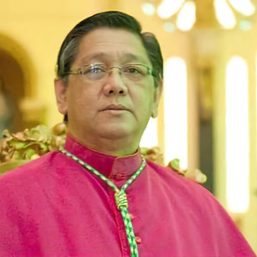
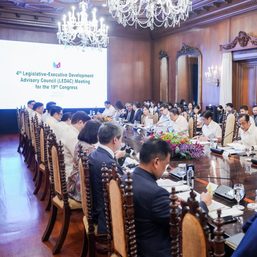
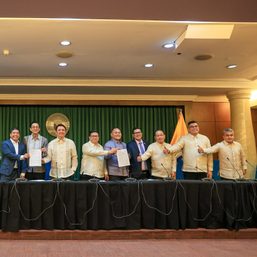
![[New School] Opening closed doors: Why full disclosure on congressional insertions matter](https://www.rappler.com/tachyon/2024/02/20240214-full-disclosure-congressional-insertions-matter.jpg?resize=257%2C257&crop=237px%2C0px%2C720px%2C720px)
![[OPINION] The House strikes back](https://www.rappler.com/tachyon/2024/02/TL-House-strikes-back-February-12-2024.jpg?resize=257%2C257&crop_strategy=attention)


![[Time Trowel] Evolution and the sneakiness of COVID](https://www.rappler.com/tachyon/2024/02/tl-evolution-covid.jpg?resize=257%2C257&crop=455px%2C0px%2C1080px%2C1080px)


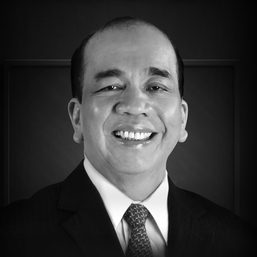


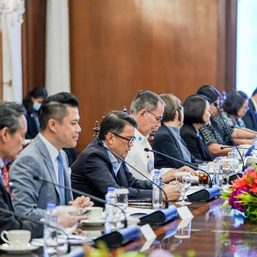
![[OPINION] The First Mode conundrum](https://www.rappler.com/tachyon/2024/03/tl-first-mode-conundrum-03232024.jpg?resize=257%2C257&crop=283px%2C0px%2C720px%2C720px)
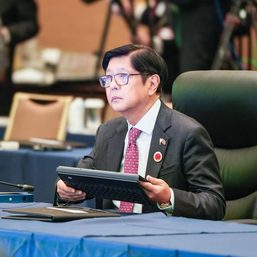

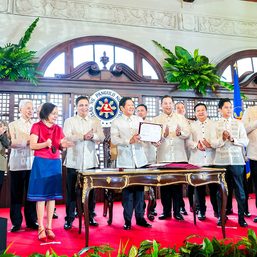
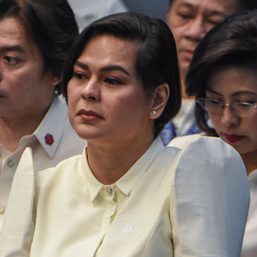

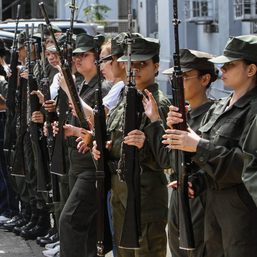

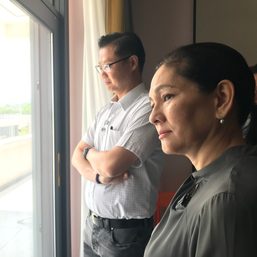


There are no comments yet. Add your comment to start the conversation.